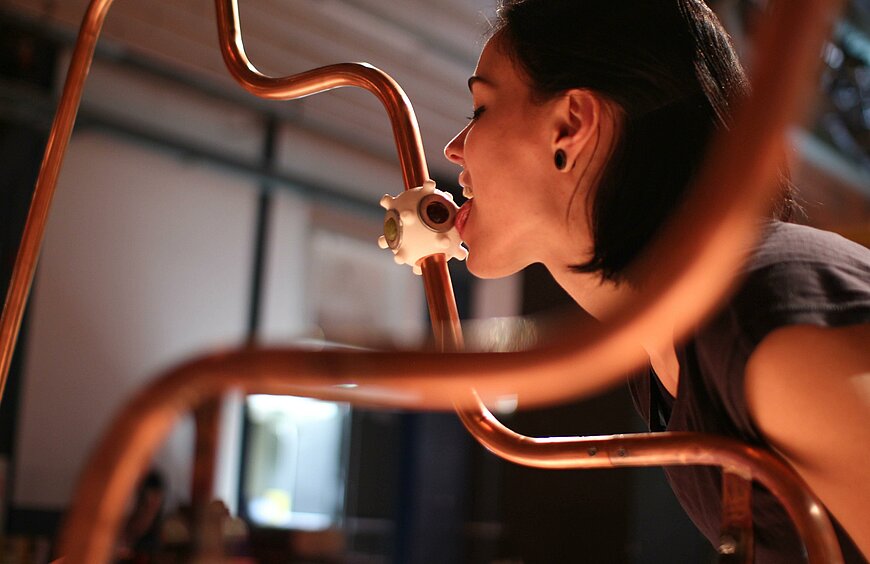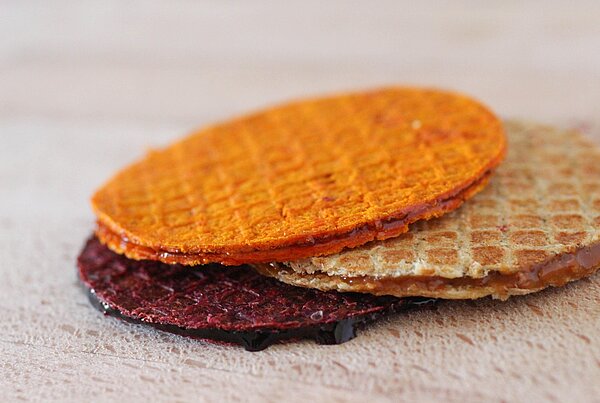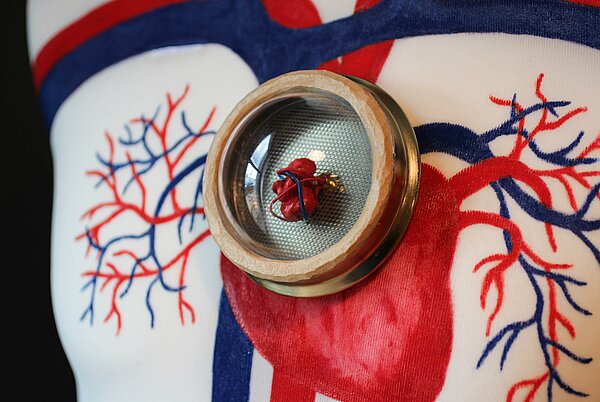Chloé Rutzerveld designs the food of tomorrow
Food and concept designer Chloé Rutzerveld encourages people to look critically at food production and food consumption.

"We have to learn to look at our food differently"
You are in for a surprise when you look at food and concept designer Chloé Rutzerveld's portfolio. It is hard to believe that somebody so young - she is just 25 - has already done so much and, above all, produced such pioneering work. Chloé's work makes people think deeply about the food they eat. The reactions range from admiration to concern and horror.
Chloé’s thesis for her course at Eindhoven University of Technology (she graduated with honours in 2014) immediately established her as a respected expert. This project, Edible Growth, involved research into how you can create a small edible ecosystem with a 3D food printer. Layers of seeds, spores, yeasts and an edible culture substrate grow naturally into a completely edible mini garden of mushrooms and cress in just a few days. This gives people the ability to grow and harvest their own food and eliminates the cost and impact of processes such as transport. A perfect example of how a 3D printer can be used for something other than creating crazy shapes, biscuits and pralines. “We have to learn to look at our food differently”, says Chloé. “The Earth's population continues to grow rapidly so we have to use our raw materials wisely and think carefully about the way in which we do things. Rather than pointing a finger of blame, my work focuses on investigating what alternatives are available to us.”

"We have to learn to look at our food differently"
Experimental dinners
Chloé prototypes those alternatives by combining scientific knowledge with technology and design. “I want to learn as much as I can. I speak to many different experts and look for possible solutions.” She communicates those solutions by holding lectures all over the world. And she also organises experimental dinners and workshops. A few years ago, nobody could have foreseen the huge impact she would have. “When I left secondary school, I had no idea of what I wanted to do. I was interested in biology, art, sports, nature, cooking and food... In the end, I enrolled for a bachelor degree in Industrial Design, but everything I produced in my first year was hideous and I didn’t get on with my coaches. It just didn’t interest me. The turning point came in my second year. That was when I came into contact with the Next Nature Network. This is an international network of people who investigate how we can preserve humanity in a world where technology is developing so rapidly. Suddenly everything gelled: my interest in science, art, technology and food.”
Cannibalism?
Chloe started to specialise in in vitro meat. “People want to eat meat, but it is not a sustainable food: meat contains relatively little protein when you consider the CO2 emissions and the amount of agricultural land required to support cattle breeding. And the Earth’s population continues to grow. So what are the alternatives? In vitro meat is an option. But you can question why you should still be dependent on animals and animal stem cells. Just how far are meat eaters prepared to go in order to carry on eating meat?”
Chloé designed a personal bioreactor in which people could grow cultures of their own stem cells on their own bodies. It took the form of an amulet; In Vitro Me (2013). “I wanted to explore the ethics of in vitro meat and get people thinking.” The reactions were fierce. “People saw it as cannibalism rather than an industrial design. It was too close to ethical boundaries for comfort. For me, it was an extreme scenario that was designed to provoke a reaction.”

"I am a perfectionist and passionate about what I do, so I always pour all my energy into my projects."
Peaks and troughs
After graduating, Chloé threw herself completely into her work. Things were not always easy for her. “I was just 20 when I held my first TED Talk in Canada and visited a conference in China. My friends and classmates developed at a different rate. Life was sometimes quite lonely. I do everything myself, ranging from raising funds to final execution and communication. Much of what I do gets debated in my own head. Fortunately, my work brings me into contact with more and more people with whom I can brainstorm and explore ideas. I am a perfectionist and passionate about what I do, so I always pour all my energy into my projects. Everything else takes second place. These peaks are always followed by a trough, both physically and mentally. Fortunately, I am learning to handle the troughs better and now use them for reflection. Nothing new get produced if everything is always in balance. When I was awarded a talent development scholarship by the Creative Industries Fund, I used some of the money for a coach. I also like to travel; visiting and exploring other cultures has meant a great deal for me.”
Growth recipes
Chloé continues to work hard, rapidly moving from project to project. Her workshop is full of showcases containing examples of her ideas. For her Digestive Food project, she developed a capsule which releases nutrients in the sequence in which the human body digests them. Efficient and sustainable. “Because undigested food is also wasted food, isn't it?” And Future Food Formula: an interactive installation where visitors can personally design a future crop based on a growth recipe. “In a growth recipe like this, they can enter settings for growth factors such as light, temperature, CO2 and water and immediately see the effect that these factors have on the plant’s growth.” Is Chloé a designer? An artist? A food technologist? She sets out lines of thought. And then she tries to get experts in large organisations and companies involved. “Many people find it interesting and innovative, but scientists are often unwilling to stray away from their own research brief and companies want to see an immediate profit.” As her portfolio has grown, Chloe has found it easier to find support and come into contact with parties who wish to collaborate with her. She developed a product called STROOOP!, a treacle waffle ('stroopwafel’) made from vegetable crop waste, in collaboration with a company based in Helmond.

"I increasingly feel part of the community here in Eindhoven."
Design capital Eindhoven
Chloé's workshop is located in Strijp-S, the creative heart of Eindhoven, the Dutch design capital. “A great place to live: close to the woods. And my workshop is next door to the facilities used for the Dutch Design Week. Working towards that event is one of my main focuses - you always want to shine on your home turf. I increasingly feel part of the community here. 2018 has largely been a year of reflection. I am working on a book that explores my questions, fascinations, discoveries and possible solutions. I also concentrate more on autonomous work and have become increasingly selective. I decide with whom I will collaborate instead of grasping every opportunity that comes my way like a dog running after a stick.”